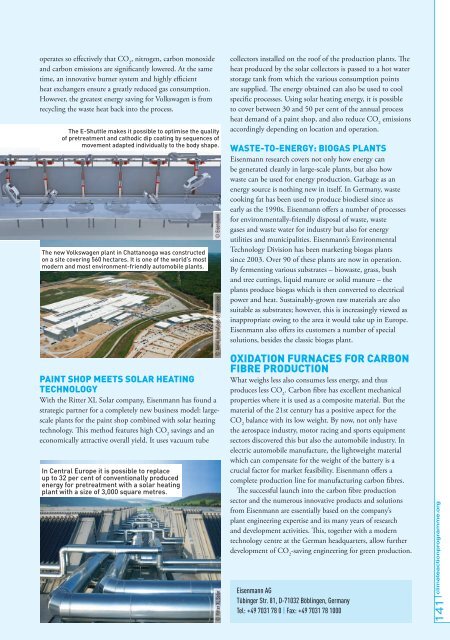Climate Action 2011-2012
Create successful ePaper yourself
Turn your PDF publications into a flip-book with our unique Google optimized e-Paper software.
operates so effectively that CO 2<br />
, nitrogen, carbon monoxide<br />
and carbon emissions are significantly lowered. At the same<br />
time, an innovative burner system and highly efficient<br />
heat exchangers ensure a greatly reduced gas consumption.<br />
However, the greatest energy saving for Volkswagen is from<br />
recycling the waste heat back into the process.<br />
The E-Shuttle makes it possible to optimise the quality<br />
of pretreatment and cathodic dip coating by sequences of<br />
movement adapted individually to the body shape.<br />
The new Volkswagen plant in Chattanooga was constructed<br />
on a site covering 560 hectares. It is one of the world’s most<br />
modern and most environment-friendly automobile plants.<br />
paint shop Meets solar heating<br />
technology<br />
With the Ritter XL Solar company, Eisenmann has found a<br />
strategic partner for a completely new business model: largescale<br />
plants for the paint shop combined with solar heating<br />
technology. This method features high CO 2<br />
savings and an<br />
economically attractive overall yield. It uses vacuum tube<br />
In Central Europe it is possible to replace<br />
up to 32 per cent of conventionally produced<br />
energy for pretreatment with a solar heating<br />
plant with a size of 3,000 square metres.<br />
© Ritter XL Solar © Aerial Innovations of Tennessee<br />
© Eisenmann<br />
collectors installed on the roof of the production plants. The<br />
heat produced by the solar collectors is passed to a hot water<br />
storage tank from which the various consumption points<br />
are supplied. The energy obtained can also be used to cool<br />
specific processes. Using solar heating energy, it is possible<br />
to cover between 30 and 50 per cent of the annual process<br />
heat demand of a paint shop, and also reduce CO 2<br />
emissions<br />
accordingly depending on location and operation.<br />
Waste-to-energy: biogas plants<br />
Eisenmann research covers not only how energy can<br />
be generated cleanly in large-scale plants, but also how<br />
waste can be used for energy production. Garbage as an<br />
energy source is nothing new in itself. In Germany, waste<br />
cooking fat has been used to produce biodiesel since as<br />
early as the 1990s. Eisenmann offers a number of processes<br />
for environmentally-friendly disposal of waste, waste<br />
gases and waste water for industry but also for energy<br />
utilities and municipalities. Eisenmann’s Environmental<br />
Technology Division has been marketing biogas plants<br />
since 2003. Over 90 of these plants are now in operation.<br />
By fermenting various substrates – biowaste, grass, bush<br />
and tree cuttings, liquid manure or solid manure – the<br />
plants produce biogas which is then converted to electrical<br />
power and heat. Sustainably-grown raw materials are also<br />
suitable as substrates; however, this is increasingly viewed as<br />
inappropriate owing to the area it would take up in Europe.<br />
Eisenmann also offers its customers a number of special<br />
solutions, besides the classic biogas plant.<br />
oxidation furnaces for carbon<br />
fibre production<br />
What weighs less also consumes less energy, and thus<br />
produces less CO 2<br />
. Carbon fibre has excellent mechanical<br />
properties where it is used as a composite material. But the<br />
material of the 21st century has a positive aspect for the<br />
CO 2<br />
balance with its low weight. By now, not only have<br />
the aerospace industry, motor racing and sports equipment<br />
sectors discovered this but also the automobile industry. In<br />
electric automobile manufacture, the lightweight material<br />
which can compensate for the weight of the battery is a<br />
crucial factor for market feasibility. Eisenmann offers a<br />
complete production line for manufacturing carbon fibres.<br />
The successful launch into the carbon fibre production<br />
sector and the numerous innovative products and solutions<br />
from Eisenmann are essentially based on the company’s<br />
plant engineering expertise and its many years of research<br />
and development activities. This, together with a modern<br />
technology centre at the German headquarters, allow further<br />
development of CO 2<br />
-saving engineering for green production.<br />
Eisenmann AG<br />
Tübinger Str. 81, D-71032 Böblingen, Germany<br />
Tel: +49 7031 78 0 | Fax: +49 7031 78 1000<br />
141 climateactionprogramme.org












